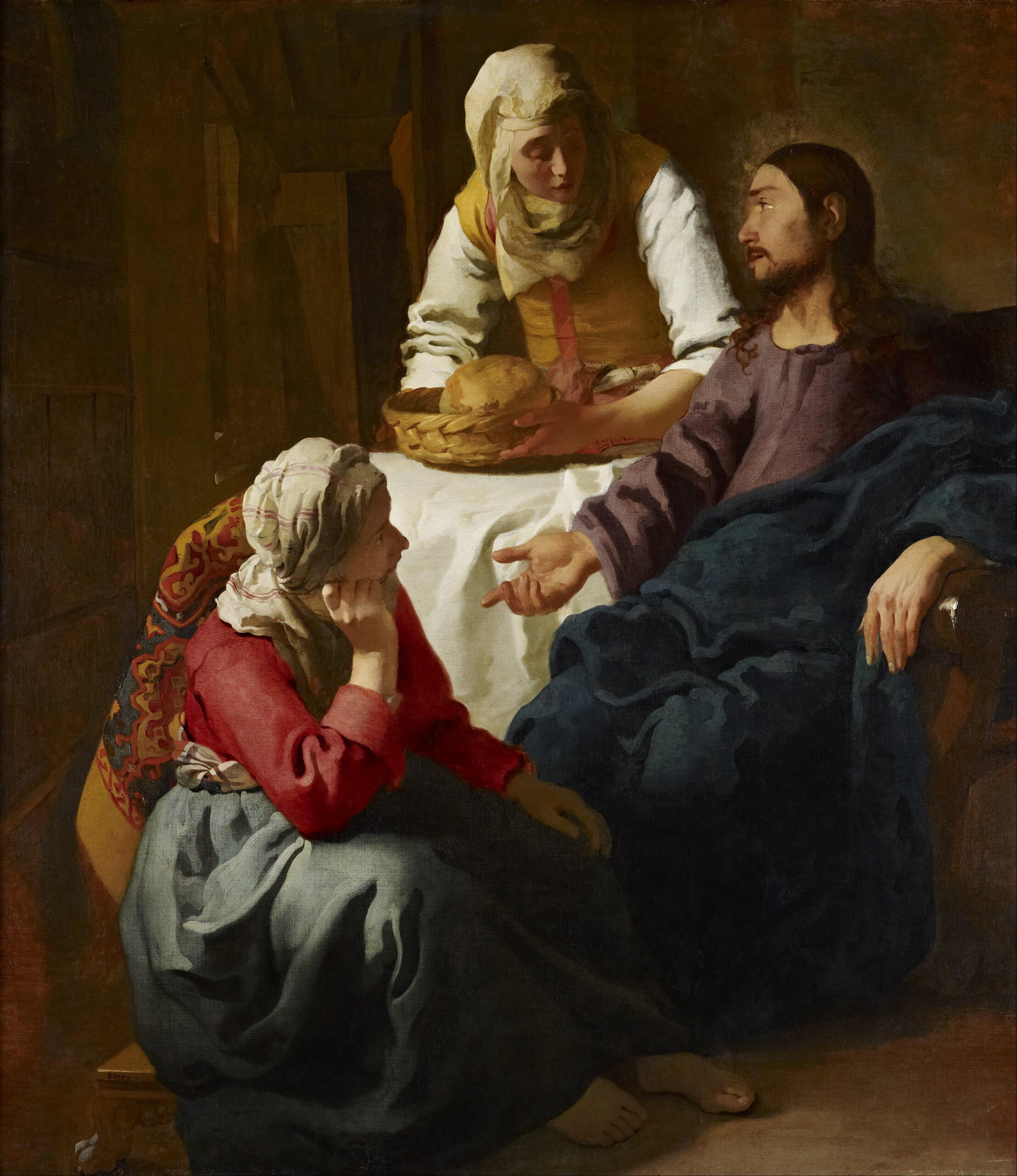This essay first appeared in our weekly Scripture reflection newsletter on July 19, 2025.
When a character besides one of the 12 apostles (or Jesus) is named in the Gospels, it means something significant. If you think about it, many of the recipients of Jesus’s miracles go unnamed. Jesus heals “a woman with a hemorrhage” or “a possessed man” or “a paralyzed man.” Even in a narrative as long and complex as the story of “the man born blind” in John’s Gospel, the recipient of the healing is unnamed. Likewise for the people involved in some of the most famous non-miraculous encounters with Jesus, such as “the rich young man.” He goes unnamed in Matthew, Mark and Luke.
But sometimes we are told the names of people outside the Twelve. Jesus meets a man named Nicodemus. After his death, Joseph of Arimathea helps with the burial. Jesus is accompanied during his public ministry by Joanna, Susanna and of course Mary Magdalene.
New Testament scholars suggest that the most likely reason is that we know their names is that these people were known to, and perhaps members of, the early church, unlike the other people, who may have had a life-changing encounter with Jesus but then slipped back into their own lives with no further contact with the disciples. And remember that before the Gospels were written down by the evangelists, they would have been shared orally. We can imagine, then, a storyteller recounting a tale about a Pharisee who visited Jesus at night and helped to prepare his body for burial but leaving out his name. Someone in the crowd would have probably said, “Hey! That’s Nicodemus! I know him!”
Chief among these named friends, disciples and followers of Jesus were the sisters Martha and Mary. Their house in Bethany, just outside of Jerusalem, was a place of respite for Jesus, as we read in today’s Gospel. It was their brother Lazarus who would later fall ill, die and be raised by Jesus from the dead. The sisters’ vivid personalities shine through to us 2,000 years later. It would be hard to forget either of them! Interestingly, Gerhard Lohfink calls them “resident disciples,” since they are not following Jesus “along the road,” as other disciples did. They remain in Bethany and their gift to Jesus is friendship.
They also knew Jesus well, which comes across strongly in today’s reading when Martha complains that she is doing all the work during Jesus’s visit, while Mary sits at his feet listening to him.
Gerhard Lohfink calls Mary and Martha “resident disciples,” since they are not following Jesus “along the road,” as other disciples did. They remain in Bethany and their gift to Jesus is friendship.
Traditional depictions of this event sometimes show Martha bending over a table with a loaf of bread or some other food in her hands. But a few years ago, when I was writing a book on Lazarus, and referred to Jesus’s encounter with the sisters, the New Testament scholar Amy-Jill Levine pointed out to me that the word used for Martha’s work was diakonia, more properly translated as “ministry” or “service.” The reason that Martha has been consigned to “peeling potatoes” in many depictions, Amy-Jill said, is that people were probably uncomfortable with her being linked to diakonia, whence comes the word deacon.
In this setting, Martha is remarkably blunt to Jesus: “Lord, do you not care that my sister has left me by myself to do the serving? Tell her to help me.” It’s an almost shocking statement directed to the Son of God. The closest analogue may be the disciples saying to Jesus, during the storm at sea, “Don’t you care that we are perishing?” (We’re also reminded of the complaint of the elder brother in the Parable of the Good Samaritan, which immediately precedes this story.) But Martha goes further, instructing Jesus what to do: “Tell her to help me.” Even the disciples, fearing drowning in a storm, aren’t so direct.
Martha is equally as blunt after the death of her brother. When Jesus finally reaches Bethany, a few days after the sisters have sent word that Lazarus is ailing, she greets him with what some say is a profession of faith, but also sounds like a reproach: “Lord, if you had been here our brother would not have died.” For her part, Mary says the same thing, word for word.
If you say only the things you think you should say to God, or that you think that God wants to hear, you may find your relationship growing more distant, colder, as you would in any relationship.
What enables Martha to be able to speak so bluntly to Jesus? Well, she clearly knows him. We speak that bluntly only to people we know very, very well. Yet Jesus is untroubled by her bluntness. In today’s Gospel, it doesn’t prompt an angry reproach, but a calming response: Don’t worry Martha, your sister has chosen the “better part.” In other words, there is a time and place for everything, and now is the time for companionship and listening. Likewise, at the tomb of Lazarus, Jesus does not scold Martha, but declares himself to be the Resurrection and the Life. In both instances, Martha’s honesty leads to Jesus being honest with her, in the first case by giving her some life advice; in another, by revealing something new about himself. Martha is rewarded for her honesty.
For Martha, openness, honesty and intimacy lead to an even closer relationship with Jesus. It’s the same in our spiritual lives. If you say only the things you think you should say to God, or that you think that God wants to hear, you may find your relationship growing more distant, colder, as you would in any relationship. (William A. Barry, S.J., makes this insight in his book God and You.) By contrast, more openness and honesty help us feel closer to God, which begets even more honesty.
Martha is memorable for many reasons: she was a close friend of Jesus, she hosted him in her house and she called to him to heal her brother Lazarus. She should be memorable for us as an avatar for openness, honesty and intimacy with Jesus, which is to say, with God.




